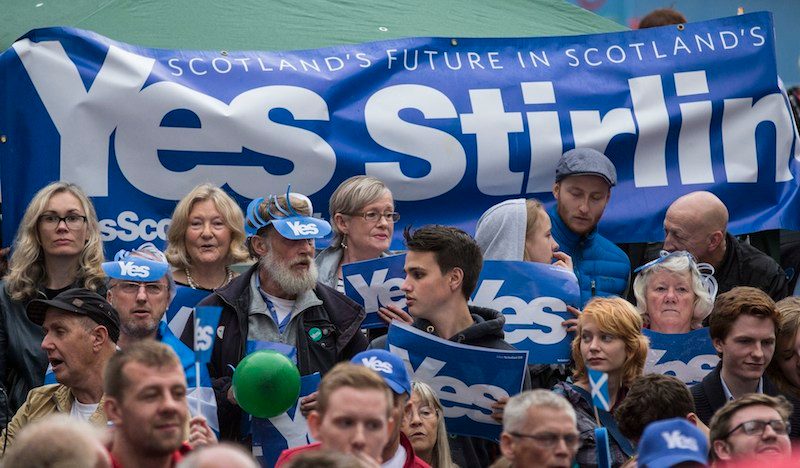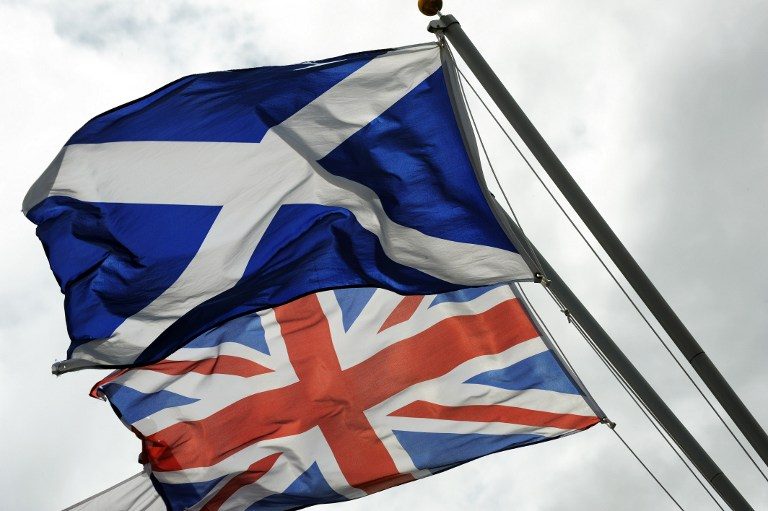SUMMARY
This is AI generated summarization, which may have errors. For context, always refer to the full article.

EDINBURGH, Scotland –Campaigners for and against Scottish independence scrambled for votes on Wednesday, September 17, on the eve of a knife-edge referendum that will either see Scotland break away from the United Kingdom or gain sweeping new powers with greater autonomy.
The “Yes” and “No” camps mobilized thousands of volunteers to hand out leaflets and hold rallies across Scotland in a final push to win over high numbers of undecided voters.
Three new opinion polls published in Wednesday’s papers all suggested a very narrow majority supporting staying in the UK but also showed that the undecideds could swing it either way.
“I’m really optimistic that if we do have independence, we can start building a society that works for all of us,” said 24-year-old Sam Hollick, a “Yes” activist from the Green Party who was campaigning at a stand on Edinburgh’s Leith Walk blaring the hit song “500 Miles” by Scottish band The Proclaimers.
Down the road at a bus stop, Steven Andrew said he had still not made up his mind.
“I’m going to be reading up on it tonight,” he said.
“I’m going to be looking at what side makes the better argument, whether I can believe one side.”
In a letter to the people of Scotland, pro-independence First Minister Alex Salmond urged the electorate to seize its historic chance to end the 307-year-old union with England.
“Wake up on Friday morning to the first day of a better country. Wake up knowing you did this – you made it happen,” Salmond wrote.
“It’s about taking your country’s future into your hands. Don’t let this opportunity slip through our fingers. Don’t let them tell us we can’t. Let’s do this.”
But Alistair Darling, a former British finance minister who heads up the “No” campaign, said there would be “faster, better change” for Scotland within the United Kingdom.
Britain’s 3 main political parties have promised increased though unspecified powers for the Scottish government in the event of a “No” vote, including on taxes and social welfare.
“We have all built the UK together and we have benefited from that strength… I think it would be a tragedy if that relationship were broken,” Darling told BBC radio.
‘Torpedo’ for Europe
Heather Whiteside, a 21-year-old graduate from Glasgow University who came to see Darling at a campaign event in the city said the prospect of a “Yes” victory was “very scary.”
“Nationalism is a bad kind of politics, it tries to create artificial barriers between people,” she said.
A vote for independence would have far-reaching implications.
It could lead to Prime Minister David Cameron’s resignation and embolden other separatist movements.
Spanish Prime Minister Mariano Rajoy weighed in on the debate on Wednesday, branding moves for independence like Spain’s Catalonia region a “torpedo” to European integration.
SCOTLAND DECIDES
On 18 September 2014, Scotland’s 4 million voters will head to the polls and answer this question: “Should Scotland Be An Independent Country?”
“Everyone in Europe thinks that these processes are hugely negative,” financially and economically, Rajoy told the Spanish parliament. (READ: ‘No’ narrowly leads as Scotland campaign enters final day)
All three polls published on Wednesday showed that support for independence had increased, but that when undecided voters were excluded, going it alone was set to be rejected by 52% to 48%.
The ICM poll for The Scotsman newspaper said “No” support was ahead on 45% to 41%, with 14% of voters still undecided.
The Opinium research agency said 49% of respondents to their survey of 1,156 backed staying in the union, with 45% set to vote for independence and 6% undecided.
Meanwhile, a Survation poll for the Scottish Daily Mail said 47.7% would vote “No” to independence, and 44.1% would vote “Yes”, with 8.3% choosing “don’t know”.
‘Down to the wire’
The debate has intensified in recent weeks as the polls have narrowed due to a surge in support for “Yes” and there have been fevered discussions in everyday life all over Scotland.
In Edinburgh, Fatima Somner, a 45-year-old cashier of Moroccan origin married to an Englishman, said she was hoping for a “No” victory.
“People who will vote ‘no’ are the ones who have money. Poorer people are going to vote ‘yes’. They hope that things will change for the better for them. But it will be the opposite, everything will become more expensive,” she said.
A client interjected: “I will vote ‘yes’ to be able to control our destiny. We are big enough and brave enough to do it.”
The “No” camp has warned that voting for independence would bring economic “uncertainty and risks”, while the separatists argue that it would ensure a healthy public sector and a fairer society shielded from London-imposed budget cuts.
Record numbers have registered for the referendum – 97% of eligible voters – and turnout is expected to be very high with officials saying it could be around 80%.
Pro-union Better Together campaign director Blair McDougall said it would be a close call.
“This vote will go right down to the wire,” McDougall said. – Rappler.com
Add a comment
How does this make you feel?

There are no comments yet. Add your comment to start the conversation.